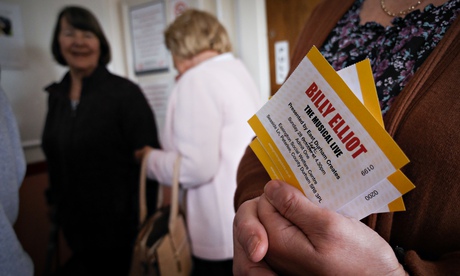
Almost everyone in Easington has a Billy Elliot story. One man claims to have received Billy’s bed from the props department after it was vacated by Jamie Bell, a local lad from nearby Billingham, who beat thousands of hopefuls to win the title role in the film. One lady remembers fake snow blocking the drains in her terraced street long after the crew had packed up in 1999.
But Sally Miller has a special claim to fame. Her husband, 52-year-old former miner Michael, was actually in it. “He played a policeman,” she said proudly. “He was between jobs at the time and he saw it advertised in the local jobcentre so thought he’d get a few days work out of it.”
On Sunday night the Millers were among 220 people from the onetime pit village in County Durham who packed into the Easington Social Centre, formerly the Colliery Miners’ Institute, for a very special show.
The hall, a focal point for the community during the crippling 1980s strikes portrayed in the film, had been turned into a cinema, and satellite equipment had been installed on the roof so that a performance of Billy Elliot the Musical – the West End spinoff of the movie – could be beamed live into the village where the film was made, as well as to 550 cinemas in the UK and worldwide.
Almost 10 million people around the world have now seen the stage show about the 11-year-old miner’s son who dreams of being a ballerina. But many in Easington, including the 400-odd locals who ended up as extras, have never made it down to London, let alone Broadway, to experience it live.
Sunday’s linkup was the next best thing, with the audience roaring with delight when Stephen Daldry, the show’s director, gave them a special mention before the curtain call. “We salute the people of Easington and welcome them to our show,” he said to cheers. Tickets for the Easington screening cost £1, subsidised by the stage show’s producers.
No one in Easington realised that the film they watched being made at the end of their streets at the end of the last millennium would turn into a worldwide hit that would be nominated for three Oscars. Nor did Jon Finn, one of the film’s producers, from Gateshead. “We thought we were making a small film. We didn’t expect it to do anything,” he said.
Finn remembers that Easington locals were “slightly sceptical, but all very warm”. Filming went smoothly but for one unfortunate night shoot. “The only time we almost came to blows was when we were shooting a night scene up at the allotments and a lighting tower crushed a bed of leeks. I can’t tell you how much upset that caused. It was the night before the giant vegetable competition, which is taken very seriously round those parts. I ended up paying the guy £2,000 compensation. I think they’d have been less upset if we’d crushed a baby.”
Finn wondered whether people in Easington would object to the gay themes in the story: Billy’s best friend Michael is a “poof”, to use the film’s parlance. “That was the thing I thought we would have most trouble with, but nobody batted an eyelid,” said Finn. “We had more trouble with that when we took it to the States. Once in a test screening someone wrote ‘fuck off fag’ on the audience card afterwards. Here, nobody seemed to care.”
Most people in Easington are enormously proud of the village’s association with Billy Elliot. There’s a proposal to commission a statue of Billy jumping in the air, said local county councillor David Boyes, who is among many in the village to claim that his old street was the site of Billy’s tap dance to the Jam’s Town Called Malice.
“It’s fantastic that a big hit film was made in Easington. We feel very lucky,” Boyes said. “But the premise of the film is a different matter entirely. The idea that Billy was only going to achieve fulfilment by leaving a community like ours and heading for the bright lights of London – I take issue with that. I have heard moaning that we are not as culturally backwards round here as the film made out.”
Usually, articles about Easington mention its unenviable position at the bottom of all too many league tables, whether for health outcomes, obesity rates or joblessness. It is regularly singled out as one of the most deprived areas of the country, with unemployment currently at 10.8%.
“A lot of bad things have been written about us here,” said Angela Surtees, another councillor. “So it was nice for the world to see somebody from a working class community like ours actually making something of themselves.”

